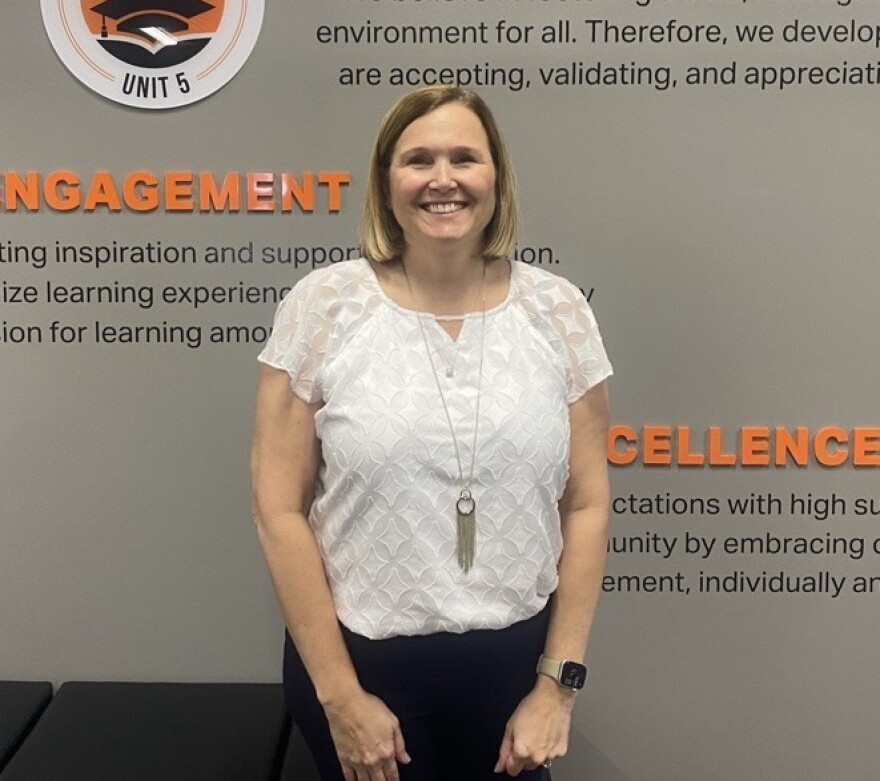Unit 5 superintendent Kristen Weikle provided updates about the Normal-based school district, including on enrollment, transportation, cell phone policy and the teacher shortage during an interview on WGLT's Sound Ideas.
Cropper GIS Consulting, which completed a capacity study in April 2024, will again provide data for Unit 5 to analyze student populations and decide whether action should be taken to address needs at schools with high enrollment.
The previous study resulted in a recommendation to add new spaces to existing buildings, instead of exploring more costly measures like building new schools. Normal Community High School was operating at capacity at that time; Normal West was nearing it.

“I think one of the positive aspects is his predictions were really pretty solid,” said Weikle, referring to Matthew Cropper, president of Cropper GIS. “They stayed true to what he predicted, and so I think that will help the school board make some informed decisions moving forward.”
A new set of recommendations, building on the information that was gathered in the first study, will be presented either late in the fall semester or early in the spring semester, with Weikle adding there will be opportunities for the community to provide feedback.
Transportation reimbursements
The state budget passed in the spring neglected to add money for reimbursing mandated categoricals — things like textbooks, meals and busing — that school districts are required to provide. That was reflected in the Unit 5 budget passed in September, when the expectation was an additional $4.2 million in transportation spending, compared with the previous year, that would not be reimbursed.
A final total from the state does not come until November, months after school fiscal year budgets must be finalized.
“This is one of the lower rates this year [compared with] what I've seen in probably about 10 years,” said Weikle. “So unfortunately, it's going in the wrong direction.”
The school board also approved a $4.5 million contract with Central State Bus Sales at the September meeting that will pay for 27 new buses for the district’s bus fleet of more than 140 vehicles.
“Twenty vehicles might sound like a lot to replace, but we have to really be on a cycle,” said Weikle. “If we only replace 20 a year, imagine all of the miles we put in, not only for the to-and-from school route, but all of those extracurricular opportunities. It just adds wear and tear to our vehicles. And so it's necessary for us.”
Cell phone policy
Unit 5 continues to monitor the new student conduct policy that only allows cell phone use in the classroom if a teacher permits it for educational purposes.
Anecdotally, said Weikle, there has been positive feedback from families and staff, adding new data on office referrals for September will provide additional detail on whether phones remain a big distraction in high school classrooms.
“Looking back to last year, it's not that we had a lot of violations,” said Weikle. “[But] we can only know about violations if a student doesn't follow the protocol, and then if a staff member submits a referral.”
The new policy was approved by the school board with the hope that it will make clear to students when it is and is not time to have a phone out. While teachers frequently brought concerns to the school board that a stricter policy was better, the adopted policy was explained to district parents as a better way to teach responsible use.
“Most students overall will follow the rules, as long as we, as the adults, explain them,” said Weikle. “Sometimes, they need reminders because they are still kids, but most students really will comply on a regular basis.”
Teacher shortage
Weikle said Illinois State and Illinois Wesleyan universities both provide many quality teacher candidates, but Unit 5 is nonetheless affected by the nationwide teacher shortage.
One measure the school district is taking to address the problem is an educational preparation program for high school students who are interested in teaching as a career. Another is helping paraprofessionals and teaching assistants earn certifications, or using teacher vacancy grants to offset their education costs.
“So really trying to invest in our own so that way they stay and want to work in Unit 5,” said Weikle.


